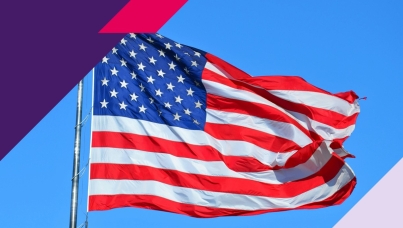

Americans show broad support for college athletes being paid through NIL and revenue sharing
Washington, DC, October 2, 2025 – A new Ipsos poll finds that Americans show strong support for paying college athletes and sharing athletic department revenues with them. The majority continue to agree that NIL has a positive impact on college athletics. At the same time, Americans also acknowledge the commercialized aspects of college athletics — a majority agree that the focus is now on making money, and some are concerned that the tradition and pageantry are being lost.
The poll also finds that pluralities of Americans report seeing more brand deals and endorsements for female athletes and express a desire to see more coverage of women’s sports. Lastly, around a third of Americans are interested in the 2026 World Cup and plan to watch, with younger generations showing more interest.
Detailed Findings:
1. A majority of Americans and sports fans support paying college athletes through NIL and sharing athletic revenue.
- Around three in five Americans (58%) and sports fans (64%) support allowing college athletes to earn money for sports-related business ventures using their name, image, and likeness (NIL).
- Similar percentages of both Americans (56%) and sports fans (63%) support colleges and universities sharing a portion of athletic revenue with athletes.
- Americans also view transparency in NIL agreements: By 51% to 10% more support than oppose requiring athletes to report NIL deals valued at $600 or more.

2. Americans and sports fans continue to believe NIL has a positive impact. However, a plurality also worry that college athletics is losing its tradition and pageantry.
- A majority of Americans (60%) and sports fans (61%) say that allowing college athletes to earn money off their name, image, and likeness has a positive impact on college athletics by ensuring players are fairly compensated. Support is similar to levels measured in February 2024 (61% and 62%, respectively).
- Americans (57%) and sports fans (64%) also agree that colleges should offer resources and guidance to athletes navigating NIL opportunities.
- While NIL is largely seen as positive, the drawbacks are also acknowledged. Fifty-six percent of Americans and 61% of sports fans say college sports are now just about making money.
- Another concern is the 37% of Americans who believe college athletics is losing too much tradition and pageantry. Gen Zers (23%) are less likely than their older counterparts to say they believe that pageantry and tradition is being lost.
3. Many Americans report seeing more brand deals for female athletes.
- Forty-three percent of Americans and half of sports fans agree that they are seeing more brand deals and endorsements for female athletes than before.
- In addition, 46% of Americans and 53% of sports fans want to see more coverage of women’s sports.
4. Americans are more likely to spend money on live tickets than streaming services.
- Fifty-seven percent agree that they are more likely to spend money on live tickets or in-person experiences (57%). In contrast, 37% are more likely to spend additional money on extra streaming platforms (37%).
- While each generation is more likely to spend money on tickets than streaming platforms, differences do exist. More Gen Xers and Baby Boomers say they would spend money on additional streaming platforms, while more Gen Zers and Millennials say they would spend money on tickets/in-person experiences.

5. Interest in the 2026 World Cup is lukewarm, and most don’t plan to watch.
- About one-in-three Americans (34%) say they are interested in the 2026 World Cup. Interest is somewhat higher among sports fans (43%).
- Among all Americans, interest is higher among Gen Zers (37%), Millennials (36%), and Gen Xers (39%) than Baby Boomers (25%).
- Just 37% of Americans plan to watch the 2026 World Cup, compared with 62% who do not plan to watch. The most popular way people plan to watch is live TV (22%), followed by streaming (14%) and clips/highlights afterwards (14%).
6. Sports fans primarily get their news about sports from sports media and social media.
- Fifty-three percent of sports fans get their news from sports media. Two-in-five report getting their news from social media (41%).
- Male sports fans are more like than their female counterparts to get their news from sports media (59% vs. 46%), while female sports fans are more likely to get their news from social media (46% vs 36%).
- Other sources for sports news include general news websites or apps (29%), podcast or YouTube channels (19%), and news aggregators (17%).

About the Study
This poll was conducted September 12-14, 2025, by Ipsos using the probability-based KnowledgePanel®. This poll is based on a nationally representative probability sample of 1,037 general population adults age 18 or older. The sample includes 745 sports fans.
The survey was conducted using KnowledgePanel, the largest and most well-established online probability-based panel that is representative of the adult US population. Our recruitment process employs a scientifically developed addressed-based sampling methodology using the latest Delivery Sequence File of the USPS – a database with full coverage of all delivery points in the US. Households invited to join the panel are randomly selected from all available households in the U.S. Persons in the sampled households are invited to join and participate in the panel. Those selected who do not already have internet access are provided a tablet and internet connection at no cost to the panel member. Those who join the panel and who are selected to participate in a survey are sent a unique password-protected log-in used to complete surveys online. As a result of our recruitment and sampling methodologies, samples from KnowledgePanel cover all households regardless of their phone or internet status and findings can be reported with a margin of sampling error and projected to the general population.
The study was conducted in English. The data for the total sample were weighted to adjust for gender by age, race/ethnicity, education, Census region, metropolitan status, and household income. The demographic benchmarks came from the 2024 March Supplement of the Current Population Survey (CPS).
- Gender (Male, Female) by Age (18–29, 30–44, 45-59 and 60+)
- Race/Hispanic Ethnicity (White Non-Hispanic, Black Non-Hispanic, Other, Non-Hispanic, Hispanic, 2+ Races, Non-Hispanic)
- Education (Less than High School, High School, Some College, Bachelor or higher)
- Census Region (Northeast, Midwest, South, West)
- Metropolitan status (Metro, non-Metro)
- Household Income (Under $25,000, $25,000-$49,999, $50,000-$74,999, $75,000-$99,999, $100,000-$149,999, $150,000+)
The margin of sampling error is plus or minus 3.1 percentage points for at the 95% confidence level, for results based on the entire sample of adults. The margin of sampling error takes into account the design effect, which was 1.05 for all respondents. For sports fans, the margin of sampling error is plus or minus 3.7 percentage points at the 95% confidence level, and the design effect was 1.05. The margin of sampling error is higher and varies for results based on other sub-samples. In our reporting of the findings, percentage points are rounded off to the nearest whole number. As a result, percentages in a given table column may total slightly higher or lower than 100%. In questions that permit multiple responses, columns may total substantially more than 100%, depending on the number of different responses offered by each respondent.
The margin of sampling error is higher and varies for results based on sub-samples. In our reporting of the findings, percentage points are rounded off to the nearest whole number. As a result, percentages in a given table column may total slightly higher or lower than 100%. In questions that permit multiple responses, columns may total substantially more than 100%, depending on the number of different responses offered by each respondent.
This topline is trended with data from previous Ipsos polls:
- The 2025 poll was fielded February 14-16, 2025 using the probability-based KnowledgePanel®. This poll is based on a nationally representative probability sample of 1,026 general population adults age 18 or older. The margin of sampling error is plus or minus 3.2 percentage points for at the 95% confidence level, for results based on the entire sample of adults. The margin of sampling error takes into account the design effect, which was 1.09 for all respondents. More information about this poll can be found here.
- The 2024 poll was fielded February 16-18, 2024 using the probability-based KnowledgePanel®. This poll is based on a nationally representative probability sample of 1,039 general population adults age 18 or older. The margin of sampling error is plus or minus 3.2 percentage points for at the 95% confidence level, for results based on the entire sample of adults. The margin of sampling error takes into account the design effect, which was 1.09 for all respondents. More information about this poll can be found here.
- The 2023 poll was fielded January 13-15, 2023 using the probability-based KnowledgePanel®. This poll is based on a nationally representative probability sample of 1,035 general population adults age 18 or older. The margin of sampling error is plus or minus 3.2 percentage points for at the 95% confidence level, for results based on the entire sample of adults. The margin of sampling error takes into account the design effect, which was 1.12 for all respondents. More information about this poll can be found here.
For more information on this news release, please contact:
Mallory Newall
Vice President, US
Public Affairs
+1 202 374-2613
[email protected]
About Ipsos
Ipsos is one of the largest market research and polling companies globally, operating in 90 markets and employing nearly 20,000 people.
Our passionately curious research professionals, analysts and scientists have built unique multi-specialist capabilities that provide true understanding and powerful insights into the actions, opinions and motivations of citizens, consumers, patients, customers or employees. Our 75 business solutions are based on primary data from our surveys, social media monitoring, and qualitative or observational techniques.
“Game Changers” – our tagline – summarizes our ambition to help our 5,000 clients navigate with confidence our rapidly changing world.
Founded in France in 1975, Ipsos has been listed on the Euronext Paris since July 1, 1999. The company is part of the SBF 120, Mid-60 indices, and is eligible for the Deferred Settlement Service (SRD).
ISIN code FR0000073298, Reuters ISOS.PA, Bloomberg IPS:FP
35 rue du Val de Marne
75 628 Paris, Cedex 13 France
Tel. +33 1 41 98 90 00



